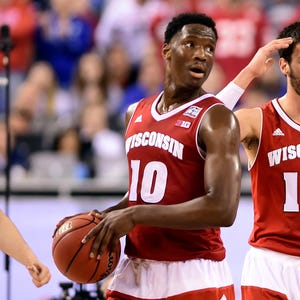If athletes ruled employees, Notre Dame will seek new sports model, AD says – USA TODAY
WASHINGTON — Notre Dame’s athletic director and Northwestern’s president emeritus said Tuesday that if college athletes ultimately are ruled to be employees of their respective schools, they foresee their universities withdrawing from the current setup of big-time sports.
Their comments come as the full National Labor Relations Board continues to deliberate about an effort to unionize scholarship football players at Northwestern. In addition, there are a range of pending federal court cases concerning athlete compensation, including one alleging that the NCAA and schools are violating the wage-and-hour provisions of the Fair Labor Standards Act by not allowing athletes to be paid at least the federal minimum wage.
“Notre Dame’s just not prepared to participate in any model where the athlete isn’t a student first and foremost — that’s the hallmark for us,” Notre Dame AD Jack Swarbrick told USA TODAY Sports after a Knight Commission on Intercollegiate Athletics meeting here during which he appeared as a panelist. “If the entire model were to move toward athletes as employees, we’d head in a different direction. Our president has been clear about that. I’m not articulating a unique position.”
Northwestern president emeritus Henry Bienen, a member of the Knight Commission, indicated during the meeting that he hopes Northwestern will leave the current form of big-time college sports if athletes are determined to be employees. The session was aimed at examining the implications of the Ed O’Bannon anti-trust lawsuit and related issues, as well as alternative regulatory systems for college sports. Afterward, in remarks he prefaced by saying he does not speak for the university, Bienen elaborated.
“If tomorrow you waved a magic wand and all football players and basketball players were unionized, and privates were paying them, that’s not where the universities would be — or should be, in my mind,” he said.
This is “not hooked to the NLRB case, per se,” he said. “That’s the opening salvo. But there’s a lot of other things floating around. … If we wound up with a business where you wound up paying the players to play, I think alumni would have a different view (of college sports). I think the faculty would be unaccepting of it, at least at universities like Northwestern and Stanford and maybe Notre Dame, Rice, Duke. … We haven’t gotten there by a long shot. Will we? I don’t know. I hope not.”
Swarbrick’s and Bienen’s comments parallel those Stanford AD Bernard Muir made to USA TODAY Sports last May after appearing before a Congressional hearing on the Northwestern unionization effort. “If (Stanford’s athletes) are deemed employees, we will opt for a different model,” Muir said at the time.
NLRB regional director Peter Sung Ohr ruled in March 2014 that Northwestern’s scholarship football players are employees of the university, and he ordered a player vote on whether to form a union. The NLRB subsequently granted a request by the university for a full-board review of Ohr’s decision, but players cast ballots in April 2014 on whether to unionize. Because of Northwestern’s challenge, the ballots were impounded by the NLRB and presumably have not been counted.
Even if the full NLRB upholds Ohr’s ruling, there likely would be many steps before a final resolution.
Because of that, Southern Methodist President Gerald Turner — a Knight Commission co-chair — said his school has made no determination of the course it would take if athletes are found to be employees.
“It’s too quick to say whether we wouldn’t play anymore or anything like that,” he said, adding that his school also would have to weigh the implications of Texas being a right-to-work state. “That would only occur after a very long review of the implications in both directions. … I think (if athletes were deemed employees), you would see the private schools in (the) FBS would be having a meeting together pretty quickly to try to talk through what the implications of it would be. But we are optimistic that we won’t have to do that.”





